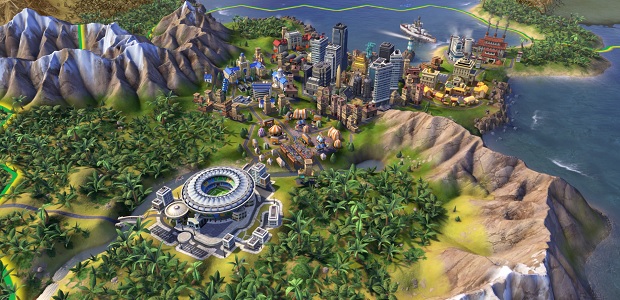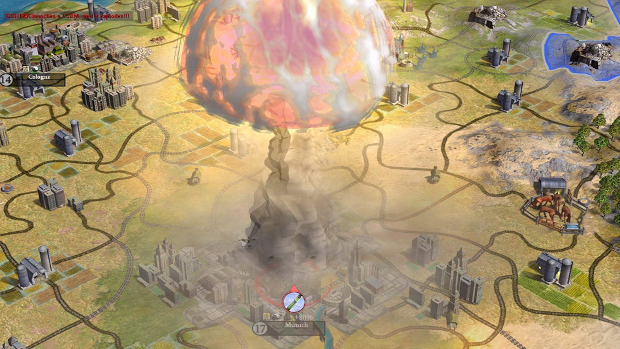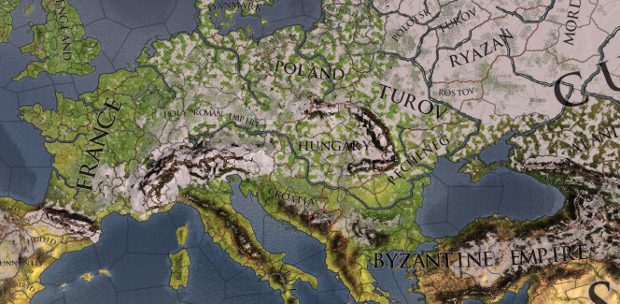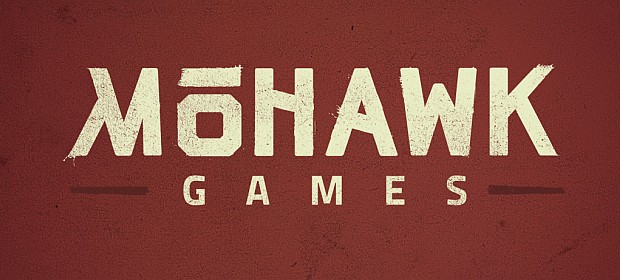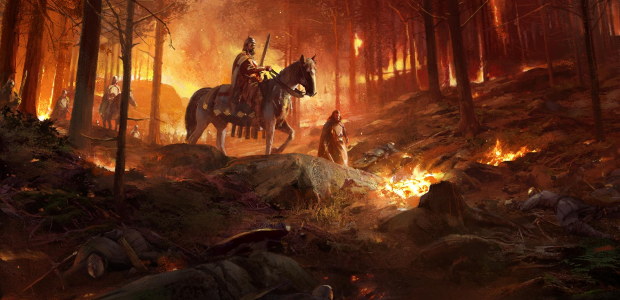Soren Johnson on challenging the norms of 4X games
Changing history
“Sid [Meier] didn’t know he was inventing a genre back in ’91 - if he had he might have been a lot more careful. He was just making it up as he went along.”
That’s how genres begin. By mistake. Somebody creates a set of rules and systems for the needs of a particular game, and then either people adopt and adapt those rules. Soren Johnson, creator of Offworld Trading Company and lead designer of Civilization IV, is working on a new game called Ten Crowns and after spending almost an hour talking with him at GDC, I get the impression he’s going to be very careful indeed. Not cautious, because I expect some bold reinvention of 4X strategy fundamentals, but careful in his treatment of a genre that we both agree needs to escape its own past.
As might be expected, we began with Civilization. It’s the single settler at the beginning of the 4X genre, planting its flag in fertile soil and watching as empires grow around it. From the not-so-humble beginnings of a game about 4,000 years of history, the 4X genre soon went to space, to fantastical worlds with multiple planes of being, and to specific times and places.
Through it all, the four Xs have endured. Whether you’re visiting a Tolkienesque land or a distant galaxy, the aim is to eXplore, eXpand, eXploit, and eXterminate, usually in that order.
Depending on your playstyle, there might be a little more exploitation and a little less expansion, or hardly any extermination at all if you’re chasing specific victory conditions. In its earliest incarnation, Civilization only had two end-games; either you eliminated every other nation or you won the space race and launched the first ship to Alpha Centauri. Broadly speaking, that’s one aggressive option for the martially minded and one more suited to leaders who prefer to concentrate on internal growth and improvement rather than conquest.
Since then, the series has incorporated a variety of victory conditions, each encouraging and rewarding a different style of play. Sometimes they involve systems that make them feel unique, as with Civ V: Brave New World’s World Congress that makes a political game out of the diplomatic route to victory. Other victory conditions feel like gathering raw materials until a tipping point is reached and success is assured; they’re like a longer-term version of the rush toward constructing a wonder.
Ten Crowns is going to be very different. Probably. It’s hard to know for sure in precisely what ways it will be different because Johnson is still figuring out the shape of the game. Victory conditions, however, are definitely on the rethinking and rebuilding agenda.
“It’s easy for me to talk about victory conditions for Ten Crowns because we haven’t made up our minds about what we’re going to do, so I can’t really spill the beans (laughs). But I’m very conflicted about the existence of victory conditions in a game like Civ. I feel like it distorts the game in a lot of ways and that doesn’t mean I necessarily have a solution or substitute for that. If you’re going to make it through a whole game of Civ, the victory conditions are a huge part of your motivation and affect the whole way you play.
“At some point, you’re no longer writing your story, you’re trying to fill up whichever bar you choose instead. This is going to be a struggle for me because I’m going to try and do it a different way, but I’m not sure yet how I’m going to get there.”
I’m going to reiterate my feelings about Civ VI and 4X games in general before I follow up on what I find so exciting about Johnson’s thoughts about the genre, and his ambitions for Ten Crowns. I like Civ VI a lot, even though I found the Rise and Fall expansion disappointing. Every month I sink hours and hours into one 4X game or another, and even though grand strategy games provide more of the emergent stories and complexity that I crave, I can’t imagine a time when I won’t have at least one Civ game on my hard drive, ready to load up when I’m in the mood to discover another new world.
Increasingly, however, I want to see 4X games making some fundamental changes. Not bolting on new features and layers, but reinventing themselves from the ground up. It’s why I love the automation of Distant Worlds, which makes me an actor in a world that doesn’t rely entirely on my input, or Stellaris’ attempts to combine grand strategy with recognisably Civ-like traits. I have a great deal of affection for the Elemental games, which bring in heroes and loot, reminding me how much I still miss enchanting items in Master of Magic.
What these games don’t address is the overall flow and shape of a 4X campaign. Stellaris introduces wrinkles in the shape of its crisis events, which interrupt the march of history with fresh conflicts, enemies and alliances, but you still smart small and hope to end big. Compare that to the kind of games Paradox have made their speciality, which have a more open structure and reward experimentation and roleplaying as well as the pursuit of perfection. Not only is the view of history more intriguing and complex, it’s also less restrictive in ways that are worth considering as strategy games become more inclusive in their representation of cultures.
The existence of victory conditions is a significant part of the problem. History and the development of a culture can be thought of in terms of winning and being better than the rest, but it is a limiting view, and the pursuit of power leaves little room for creative expression. I’d love to build a city that is wildly wasteful and inconvenient but captures some of the character of my people.
And that’s why Johnson’s conflicted feelings about victory conditions excite me. Recent Civ games have focused on the individual qualities of nations, giving their leaders personality traits, and giving the civs themselves their own rulesets. I’m interested to know how Johnson feels about those changes and how they affect the shape of the game, and it’s structure as a race toward the end of history.
“I think the steady trajectory toward victory is definitely a problem. It’s absolutely one of the top three or four things we’re trying to do with Ten Crowns, to approach those ideas in a different way.”
“Civ is difficult because they’re stuck with a certain trajectory. Sid didn’t know he was inventing a genre back in ’91, he was just making this up a he went along. And because he chose to make a game that was about all of human history, and beyond that because it’s such a broad view of history, it’s hard to make that about something other than just accumulation and things getting better and better.
“I was a part of this too, with Civ 3 and 4. We were always hesitant to take something away from the player. There’s a typical story we try to tell. In Civ IV we introduced Golden Ages, but originally they were Dark Ages. That was something that we wanted to incorporate because it’s something that’s in history and it’s important to talk about. But players really didn’t like it.
“The game has a certain pace and suddenly that was changed. Everything was taking longer and players weren’t as strong as they used to be. So we thought, let’s flip it on its head and instead of Dark Ages they’ll be Golden Ages.
“This is an approach that you’ll see all over the place. Maybe you’re familiar with the story of World of Warcraft and their rest mechanic. Originally, they penalized you for playing the game too much, but players didn’t like that, so instead they gave you a Rest Bonus. Basically, for the first hour of each day you got double experience. It was encouraging you to follow a certain playstyle – but the point is that they started with a negative and then flipped it on its head.
“And that’s something that’s built into the Civ designer mentality. You can’t take things away from players. But things have changed. What people are OK with and their expectations of what games do have changed. The thing that made me realise this was the success of the Paradox games. It was almost like these games existed in a bizarro universe where the rules are different.”
The first Paradox game I played, Europa Universalis II, changed the way I thought about strategy design. Crusader Kings and its sequel even more so. Suddenly here was this game where you didn’t have to be a major power and there was no pressure to try and rise to the top. Sometimes it can be more fun to be subservient to the simulation rather than attempting to dominate it. If the end-point of Civ is always known, perhaps some of the joy of Crusader Kings is in allowing the tides of alternate history to carry you to places that you didn’t expect to exist or intend to visit.
“Right. And you might have your moment in the sun and you take a backseat for a while, and maybe you’ll come back or maybe you won’t. You accept that there are twists and turns to life, and that’s also true in history.
“They did all sorts of things, like the way war is handled. In Civ you can basically declare at any time and if you take a bunch of cities they’re yours. In Crusader Kings, that’s no longer true. You have to have a reason to declare war and even if you take a bunch of cities, you need to negotiate what happens to those cities at the end of the way.
“I find all of that really interesting. Ultimately, though, it’s not about whether we’re being true to history. It’s also a gameplay problem. If the game is just on this continual upward trajectory, it just gets boring. You need some sort of challenge and pushback.
“Traditionally, in Civ, that comes from external forces. Other civilizations. I think that was totally fine in 1991. But nowadays there is a lot more you can do.
“Right now with Ten Crowns, we spent the first x number of months building a multiplayer version. That’s how I like to start. It’s good to get all of that in place right off the bat and you can get a good sense of the feel of the game in multiplayer because it’s always good to try and beat your friends.
“But in the last six to nine months I’ve mostly been playing singleplayer. I’ll start a game, play as long as I can, and I’m adding layers over time. And I’ve actually been holding off, longer than I thought I would, putting in any AI opponents.
“Currently, I’m playing with a subset of the game where there are no other players so you’re only dealing with internal issues and what you would normally call barbarians in a game of Civ. External tribes, which aren’t another player in the game but are a problem. I don’t have the exact term for what we’ll call them yet.
“What I’ve found is that I’ve been able to make the game good enough that it’s enjoyable at that level. If you think of a game of Civ where you’re the only player on the board, that would be pretty boring. So I set the bar for myself that Ten Crowns should be interesting even if there aren’t any other civs involved. Pretty soon I need to add that layer, but it was important for me to have enough stuff going on internally that the game is still fun without opponents.
“So there might be a period of time where I was really good at science, then one where I was really bad at it, and what does that mean for how the game plays? Or maybe there was a time when I could build powerful military units easily and I was really strong, but now I’m not. Or I’ve lost a bunch of cities but I can see a path to reclaim them.”
This brings us back to players not liking it when a game takes things away from them. One possible solution, I suggest, is to ensure that when a thing is taken away, the game offers something else in return. You might lose a city or a resource, but in exchange for that loss you receive interesting choices. Failure, or loss, open up new avenues and possibilities rather than closing them down. It’s certainly true of my own experience that I don’t mind losing something as long as I’m given interesting choices in order to negotiate a solution to that loss.
“In 4X, the early stages where you have just a few cities or units work really well. What I want is a way for the game to put you back into that situation a few times. At that point, you know you have a few interesting options and the longer you play, the more they get pared back.
“I am thinking about all of these issues. How you can show the ways a nation changes over time, so you can look back over two or three hundred years of history and see actual changes and obstacles you overcame."
When a nation’s character is partially set in stone by the unique qualities that the game gives it from the very beginning, it’s hard to see change happening. Progress, yes, but not swerves and meaningful setbacks along the route. The idea of building a nation or an empire that accrues an identity over time, and for that identity to be malleable, is attractive to me but I’m not clear on how it might work.
In some ways, what I’m interested in is a strategy game that asks me to be reactive. There’s some of that in Civ, particularly during the exploration phase when you’re discovering a new world and trying to make the most of it. As time passes, it becomes a game about stamping your authority on your surroundings though - the exploitation, expansion and extermination phases of play.
I asked Johnson if he’d considered the challenge of a 4X game where your nation begins as a blank slate, where you spend the game in a process of becoming a type of people.
“I think that’s what Jon (Shafer) was trying to do with the social policies in Civ V. I think the trend toward very strong civ powers is seen through all sorts of games – whatever the appropriate term might be in any genre. Whether it’s a fighting game with very specific character powers, or something like StarCraft as a classic example. For a lot of strategy games that’s become standard.
“Civ was actually fairly slow to embrace that. In Civ III we had this weird matrix thing with six civ bonuses and each civ had two different ones. They weren’t very strongly differentiated. But then each version since has gone further down that path. I think that was mainly done for gameplay reasons, but once you go down that path, you do lose that sense of writing history as opposed to doing a culture run and then a religion run, or whatever.
“I don’t think it’s necessarily even intentional. People do like the variety of the different civs and giving them those choices is a perfectly valid design decision, but one ramification of that is that you may feel that your path is set from the very beginning.
“It’s weird because I’ve heard people say both things about Civ: that they like playing with the different civ traits, but they don’t like feeling like they’re being railroaded into a certain playstyle. In truth, the two things are closely interconnected. It’s a dilemma.”
It’d be unfair to view Ten Crowns as nothing more than a reaction to existing dilemmas. Even in these early stages of development, however, there are points when Johnson almost has to bite his tongue during our conversation. It’s too early for him to discuss specifics because so few things are decided, but whether its maps, victory conditions, AI, political strife or battles, he sees the standards of the genre as a challenge rather than a given. That attitude might just lead us somewhere altogether different than the familiar routes through history, and I reckon it’s about time.


